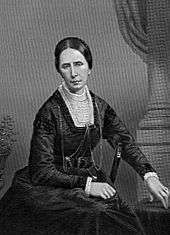Minuscule 540
Minuscule 540 (in the Gregory-Aland numbering), ε 334 (in Soden's numbering),[1] is a Greek minuscule manuscript of the New Testament, on a parchment. Palaeographically it has been assigned to the 14th century.[2] Scrivener labelled it by number 553.[3] It has marginalia. The manuscript has no complex context.
| New Testament manuscript | |
| Text | Gospel of Mark |
|---|---|
| Date | 14th century |
| Script | Greek |
| Now at | University of Michigan |
| Size | 18 cm by 13.8 cm |
| Type | Byzantine text-type |
| Category | V |
| Hand | neatly written |
| Note | marginalia |
Description
The codex contains the text of the Gospel of Mark, on 27 parchment leaves (size 18 cm by 13.8 cm), with some lacunae (3:21-4:13; 4:37-7:29; 8:15-27; 9:9-10:5; 10:29-12:32). It is written in one column per page, 17-21 lines per page.[2] According to Scrivener it is neatly written. The original codex consist 48 leaves.[3]
The error of itacism is rare (20 occurrences); it has iota subscriptum; error of homoioteleuton is found only in Mark 9:38; N εφελκυστικον occurs 25 times, mostly with ειπεν.[4]
The text is divided according to the κεφαλαια (chapters), whose numbers are given at the margin, with their τιτλοι (titles of chapters) at the top of the pages. There is also a division according to the smaller Ammonian Sections, with references to the Eusebian Canons (written below Ammonian Section numbers).[3][5]
Text
The Greek text of the codex is a representative of the Byzantine. Aland placed it in Category V.[6]

History
C. R. Gregory dated the manuscript to the 14th century.[5] Currently it is dated by the INTF to the 14th century.[2]
In 1864 the manuscript was purchased from a dealer at Janina in Epeiros, by Baroness Burdett-Coutts (1814–1906), a philanthropist, together with other Greek manuscripts (among them codices 532-546). They were transported to England in 1870-1871.[5][7]
The manuscript was presented by Burdett-Coutts to Sir Roger Cholmely's School, and was housed at the Highgate (Burdett-Coutts II. 26. 1), in London.[5] It was examined and collated by Scrivener in his Adversaria critica sacra (as m).[8]
It was added to the list of the New Testament manuscripts by F. H. A. Scrivener (553) and C. R. Gregory (540).[3] Gregory saw it in 1883.[5]
It is currently housed at the University of Michigan (Ms. Inv. No. 23a) in Ann Arbor.[2]
See also
- List of New Testament minuscules
- Biblical manuscript
- Textual criticism
References
- Gregory, Caspar René (1908). Die griechischen Handschriften des Neuen Testament. Leipzig: J. C. Hinrichs'sche Buchhandlung. p. 67.
- Aland, Kurt; M. Welte; B. Köster; K. Junack (1994). Kurzgefasste Liste der griechischen Handschriften des Neues Testaments. Berlin, New York: Walter de Gruyter. p. 78. ISBN 3-11-011986-2.
- Scrivener, Frederick Henry Ambrose; Edward Miller (1894). A Plain Introduction to the Criticism of the New Testament. 1 (4 ed.). London: George Bell & Sons. p. 254.
- Frederick Henry Ambrose Scrivener, Adversaria critica sacra (Cambridge, 1893), p. XLVI.
- Gregory, Caspar René (1900). Textkritik des Neuen Testaments. 1. Leipzig: Hinrichs. p. 201.
- Aland, Kurt; Aland, Barbara (1995). The Text of the New Testament: An Introduction to the Critical Editions and to the Theory and Practice of Modern Textual Criticism. Erroll F. Rhodes (trans.). Grand Rapids: William B. Eerdmans Publishing Company. p. 139. ISBN 978-0-8028-4098-1.
- Robert Mathiesen, An Important Greek Manuscript Rediscovered and Redated (Codex Burdett-Coutts III.42), The Harvard Theological Review, Vol. 76, No. 1 (Jan., 1983), pp. 131-133.
- F. H. A. Scrivener, Adversaria critica sacra (Cambridge, 1893).
Further reading
- Frederick Henry Ambrose Scrivener, Adversaria Critica Sacra: With a Short Explanatory Introduction (Cambridge, 1893), pp. XLVI-XLVII. (as m)
- Kenneth W. Clark, A Descriptive Catalogue of Greek New Testament Manuscripts in America (Chicago, 1937), pp. 293–294.
External links
- Images of the minuscule 540 at the CSNTM